Text by Tim HESLER, GMBA Class of 2017; Photo by Xiangsheng YANG, GMBA Class of 2017
In late June, the Tsinghua-MIT Global MBA
Class of 2017 had the opportunity to experience MBA life across the Pond. In
the wake of the semester’s conclusion, approximately half of the GMBA class trekked
to Cambridge, Massachusetts to participate in an elective module at MIT Sloan
School of Management. Joining the first-year students were two distinguished
SEM alumni as well as Tsinghua SEM Associate Dean and Professor
QIAN Xiaojun, Senior Manager of Global Collaboration and Admissions Doris
XUN, and Corporate Relations Director Fany CHEN. As Tsinghua SEM and MIT Sloan marked
20 years of a tightly knit relationship, four of MIT Sloan’s top faculty and
several other members of the broader Sloan community challenged the thinking of
the GMBA cohort along a variety of dimensions, with a particular emphasis on
innovation and entrepreneurship.
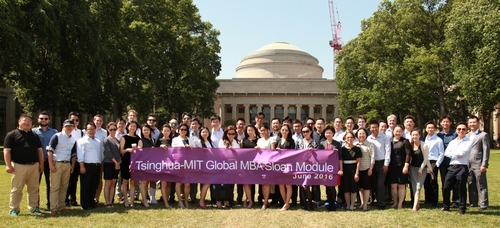
During the first two days of the course, Professor
John Akula facilitated a discussion of key legal frameworks essential to
the aspiring entrepreneur’s tool kit. Himself a practicing attorney of many
years, Professor Akula injected a particularly practice-based legal perspective
into classroom dialogue. Professor Akula walked the cohort through a variety of
frequently litigated corporate contractual provisions and their implications as
construed by courts in various U.S. jurisdictions. Meanwhile, he also solicited
cohort expertise for comparative purposes between judicial interpretations in
China and those in the U.S. Ultimately, he brought those observations to bear
in the context of early-stage agreements with corporate partners and new employees
– both extremely salient for startups, especially those planning to predicate
their ventures on the cross-border marketplace.
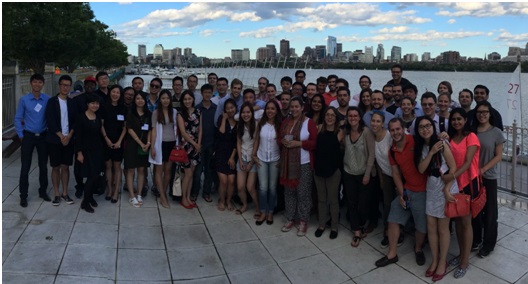
After laying a foundation of legal
analysis, the cohort continued to expand its view of entrepreneurship as a process
with the insight of Professor
Bill Aulet, author of Disciplined
Entrepreneurship: 24 Steps to a Successful Startup. Perhaps one of
Professor Aulet’s most striking points was the implication behind an economic
downturn constituting a statistically good time to start a new venture. As
Professor Aulet suggested, a downturn creates an ideal season for pulling in
relatively inexpensive but capable labor while developing “frugal corporate
muscles.” Once those frugal muscles are built, if coupled with an otherwise well-constructed
corporate culture, then even as the economy recovers, much of the existing
labor force will often remain loyal without forcing a company to abandon those
frugal muscles that have built the company’s success. Retaining a lean
operational orientation, Professor Aulet noted, can be critical not only to
survival in downturns but also to fully thriving even in more forgiving
economic seasons.
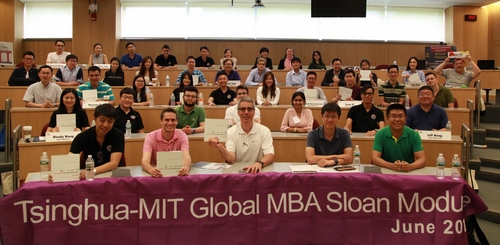
Professor
Nelson Repenning, meanwhile, offered an introduction to dynamic work
design, considering response mechanisms when things don’t go as planned – as is
often the case in a startup context. Professor
Repenning offered a layman’s overview of a body of neuroscience research that
has distinguished two processing modes of the brain – conscious and automatic –
and suggests that humans tend to save their conscious processing capacity,
which is limited, and offload as much responsibility as possible to automatic
processing.
In the context of dynamic work design,
Professor Repenning suggested that work done by humans, no matter how
automated, is still a fundamentally human activity. Thus, he put forward four
principles for dynamic work design: (1) reconciling action with intent, for
example with pattern matching; (2) structured problem solving; (3) using
optimal challenges with reasonable targets (How much gap between activity and
intent can we successfully manage, and is there sufficient time to tackle gaps
when people fall short?); and (4) connecting the human chain. As one simple
application of the final principle of connecting the human chain, Professor
Repenning suggested that in well-designed work, people know and have regular
contact with those who supply the inputs to their work as well as those who
receive the outputs.
As Professor
Jake Cohen opened the morning of the module’s final class on Friday the
24th, he temporarily dispensed with the scheduled M&A case discussion in
order to address a global development of emerging import. Just a few hours
prior, the UK’s decision by popular vote to withdraw from the European Union
had become official as the votes were tallied. Professor Cohen explored the
potential ramifications of “Brexit” alongside the class, offering not only
answers but also open-ended, thought-provoking questions on the future of
European and global commerce.
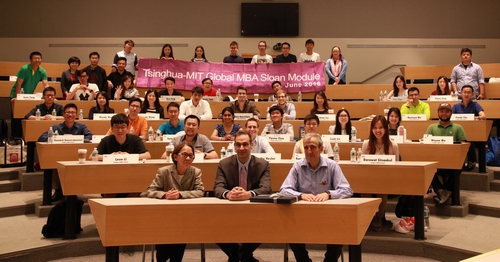
The cohort also welcomed a variety of guest
speakers throughout the module and in turn conducted several local site visits.
Professor Akula introduced a variety of MIT alumni, including Wan Li Zhu, a
leading figure in the Boston angel investing community. Wan Li graciously offered
two solid hours of insight into angel financing and witty exchange with
students. Panel discussions with players from MIT spinoffs Woobo and XtalPi offered unique angles into technology commercialization. Finally, the cohort
was also treated to site visits at: (1) 11-year-old Carbonite, a cloud-based data
backup and security company; (2) the Martin
Trust Center for MIT Entrepreneurship, complete with its full range of resources
for MIT affiliates across a spectrum of stages; and (3) CIC
Cambridge, an entrepreneurially oriented workspace that offers the
advantage of being home to more startups than anywhere else on the planet.
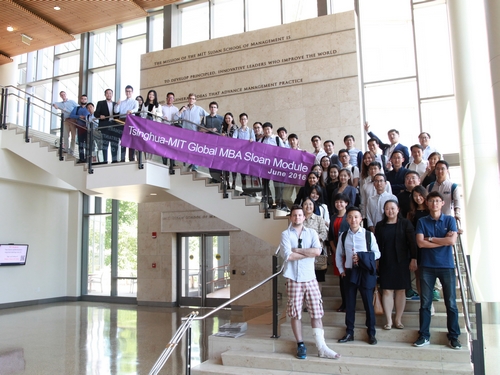
As the cohort engaged with MIT faculty,
staff, and the greater institutional community over the course of the module, students
grew in their appreciation for SEM’s long-standing relationship with our sister
school in the Tsinghua-MIT Global MBA partnership. The module’s heavy emphasis,
even in its classroom components, on moving beyond theory to application and
stepping outside the traditional confines of academia, was refreshing and inspiring.
Ultimately, the module served as both an apropos capstone to a year of
integrated MBA study and an optimal pivot point for students returning to
Beijing for a second year of increasingly focused immersion in China’s own
hotbed of innovation.